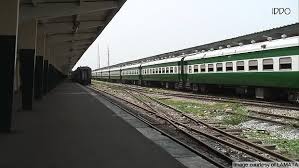Government urged to link major airports to rail lines
The National Conference sitting in Abuja on Tuesday asked the Federal Government to ensure that every major airport in the country is linked to functional rail lines to boost easy access to airports across the country.
Government was also asked to initiate and construct a rail line from Lagos to Enugu through Ore to ease movement of goods and passengers from the Western flanks of the country to the East and South South.
It was also resolved that rail lines should be made to have a dualisation policy to allow for mass movements of trains as obtained in developed rail systems in other parts of the world.
In order to reduce road accidents and other associated hazards, Conference said effective rail system should be developed such that petroleum products can be transported from one part of the country to the other.
In addition, Conference said government should as a matter of urgency complete the National Hanger Project at Uyo Airport in Akwa Ibom State so that it would serve as a repair and maintenance hub to airlines operators.
These were part of the recommendations adopted by the Conference during the debate and consideration of the Report of the Transportation Committee headed by Senator Musa Adede with a retired Assistant Inspector General of Police, Ralph Ola Osanaiye, as deputy chairman.
The Committee had observed that the existing transportation infrastructure in Nigeria comprising roads, railways, ports, airport and pipelines is inadequate in terms of accessibility and inter-operability.
It located that the transportation sector represents a significant proportion of Nigeria’s key infrastructure because it facilitates the links between spatially located facilities and acts as mechanism for maintaining social contact.
Transportation, it said, affects the totality of a country’s activity ranging from its people, economy, environment and even its politics.
At the same time, the report noted that an ineffective transportation system could frustrate the efforts of government and the people, while an adequate transport system can impact positively on the national development and enhance the standard of living of the people.
It noted, “a well-planned and developed inter-modal transportation system is an essential infrastructure requirement for socio-economic development.
“Transportation goes beyond facilitating the movement of people and goods but also contributes to the regional and national development creating positive multiplier effects on all sectors of the economic activities, which will lead to job creation and poverty alleviation.”
It said further that the most central challenge identified in this sector is the absence of an integrated approach to transportation development and management in Nigeria.
According to the committee, the absence of a central authority to oversight the implementation of the various National Transportation Master Plan and the heavy dependence on budgetary provision for transport development has led to inadequate funding regimes and distortions in most transport projects.
The committee observed that the privatization of projects such as the ports concessioning has not also removed the financial burden from government as public funds are still being applied to the expansion and maintenance of the facilities, leaving the concessionaires to collect revenue.
Conference accepted its recommendation that government should review the existing transportation master plan for each sector based on economic analysis, to determine the economic rate of return on each transportation project looking at the economic impact and financial implication of such projects.
Such plan, as adopted by the Conference, should prioritized projects based on economic analysis and budget constraints so as to determine the diverse range of benefits.
Such benefits include: accessibility and social benefits; economic and growth benefits; decongestion benefits; environmental benefits; health and social benefits; infrastructure maintenance benefits; and operation and maintenance benefits.
It was accepted that foreign airlines be encouraged to employ Nigerian pilots and other staff as the number of unemployed qualified Nigerians in this sector compared to the burgeoning number of their foreign counterparts is precarious and unacceptable.
Conference said government should ensure urgent construction of perimeter roads and fences around the airports so as to enhance airport security and prevent incidents of stray animals colliding with aircraft on the run way.
It was also resolved that the abandoned Onitsha Cargo Airport in Anambra State should be completed to enhance commercial activities in the South-east.
Government was also mandated to fast-track the completion of Lokoja and Onitsha ports projects; and also dredges all inland waterways.
On roads, Conference said government must, as a matter of priority, fast-track the completion of East-West Road which links the southern parts of the country to the western part to enhance effective transportation within the geo-political zones.
Government was also tasked to establish Road Development Fund for the development and maintenance of public roads and that the sources of revenue may include among others, toll gates with a provision for alternative routes, vehicle tax, weigh bridges, parking fees and petroleum tax.
It was decided that there should be a legal framework for the private sector participation in the financing and management of public roads in he country.
Conference also asked the Federal Government to start work on the Nigerian sector of the Trans-African Highway as a way of easing transportation with the African continent.





